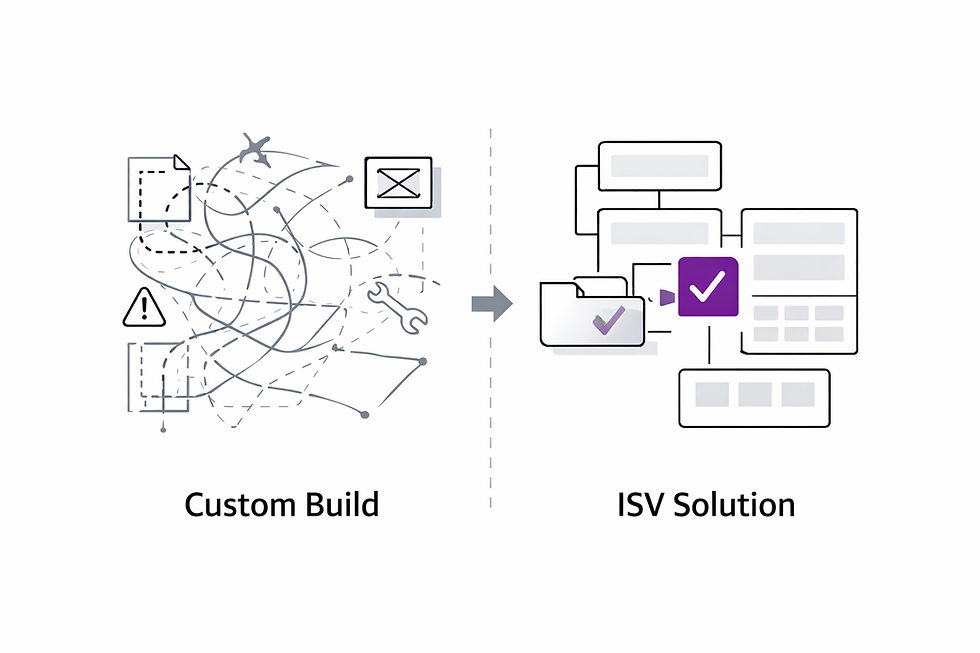Microsoft Dynamics 365 vs QuickBooks: Empowering Fast-Growing Startups with the Right ERP
- Carina Gregersen
- Feb 8, 2024
- 4 min read
Updated: Jun 18, 2024
Part I - Aligning ERP Choices with Startup Growth Trajectories: Dynamics 365 vs. QuickBooks
Navigating the growth of a startup demands strategic choices, especially when it comes to selecting the right tools and systems that form the backbone of the business. Among these, choosing the correct Enterprise Resource Planning (ERP) system is crucial, as it can significantly impact the operational efficiency and scalability of the business.
In this two-part blog series, we compare two leading ERP solutions: Microsoft Dynamics 365 and QuickBooks. Each part of this series aims to shed light on how these platforms cater to the evolving needs of fast-growing startups, focusing on their features, scalability, cost-effectiveness, and overall suitability for different stages of startup growth. By diving deep into the specifics of each system, this series will guide startup owners towards making an informed decision that aligns with their growth trajectory and operational needs.

Dynamics 365 for Startups: Beyond Basic Financial Management
For startups on a rapid growth trajectory, Microsoft Dynamics 365 offers a comprehensive solution that goes far beyond basic financial management. It's designed to support various aspects of a growing business, making it a suitable choice for startups looking to scale efficiently.
Comprehensive Business Solutions: Dynamics 365 provides an array of functionalities that are essential for growing startups. It encompasses not just finance and operations, but also customer relationship management (CRM), supply chain management, human resources, and analytics. This holistic approach allows startups to manage all their business processes within a unified platform.
Scalability and Flexibility: One of the key strengths of Dynamics 365 is its scalability. As startups grow, their needs become more complex. Dynamics 365 can scale to meet these evolving requirements without the need for a complete system overhaul. Its modular nature means startups can start with what they need and add more functionalities as they expand, ensuring that the ERP system grows with the business.
Advanced Features for Emerging Needs: As startups evolve, the need for advanced features becomes critical. Dynamics 365 offers capabilities like AI-driven insights, advanced data analytics, and comprehensive reporting tools. These features enable startups to make data-driven decisions, understand customer behaviors, and streamline operations – all essential for sustained growth.
Integration Capabilities: Dynamics 365’s ability to seamlessly integrate with other Microsoft products like Azure, Office 365, and Power BI, as well as various third-party applications, ensures that startups have a cohesive and interconnected IT ecosystem. This integration is crucial for maintaining efficiency and continuity as the business grows.
In contrast to basic accounting software, Dynamics 365 is an ERP system that can start small but has the capacity to support complex, multi-faceted business operations. For startups, this means investing in a system that won’t become obsolete as they expand, providing long-term value and supporting their growth every step of the way.
QuickBooks: The Starting Point for Basic Needs
QuickBooks, widely recognized for its simplicity and effectiveness, has often been the initial choice for many startups at the very beginning of their business journey. It serves as a practical solution for managing basic financial tasks but comes with its own set of limitations, especially for rapidly growing startups.
Ease of Use and Basic Financial Management: QuickBooks is known for its user-friendly interface, making it accessible for startups without extensive accounting knowledge. It efficiently handles fundamental financial tasks such as invoicing, payroll processing, and basic bookkeeping, which can be sufficient for very small businesses or those in the early stages of growth.
Limited Scalability: As startups expand, their operational complexities tend to outgrow the capabilities of QuickBooks. It's primarily designed for small businesses and lacks the extensive scalability offered by more comprehensive ERP systems like Dynamics 365. This limitation can become a significant hurdle for startups experiencing rapid growth, as they may soon find themselves needing a more robust system to manage their evolving business demands.
Restricted Advanced Features and Integration: While QuickBooks offers some integration with other applications, its scope is limited compared to Dynamics 365. The lack of advanced features such as detailed analytics, CRM, and comprehensive supply chain management means that growing startups might quickly outpace what QuickBooks can offer. This can lead to a need for additional software solutions, complicating the IT infrastructure and potentially leading to integration challenges.
Concluding Microsoft Dynamics 365 vs QuickBooks
In summary, QuickBooks serves as a good starting point for startups with basic financial management needs. However, for startups on a rapid growth path, it's crucial to anticipate future needs and consider an ERP system like Dynamics 365 that can accommodate growth and complexity without the need for a future system migration, which can be both disruptive and costly.
As we've explored the dynamic capabilities of Microsoft Dynamics 365 vs Quickbooks in supporting early-stage startups, it's clear that the journey from a small to a rapidly growing startup involves evolving needs and complexities. Microsoft Dynamics 365, with its scalable, comprehensive solutions, stands out for businesses poised for significant expansion, while QuickBooks offers the simplicity and ease needed for startups at the onset of their journey. In the upcoming second part of this series, we'll delve deeper into real-world applications, customer testimonials, and strategic considerations to further illuminate how choosing the right ERP system can become a cornerstone of your startup's success story.


